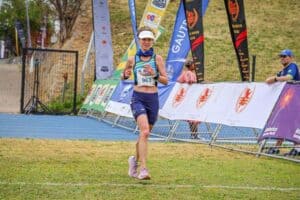Only 415 runners finished the 42km race, which carried a prize purse of more than R2.8 million.

Last week, one of the richest marathon races in Africa was held in Mbombela, and it went largely unnoticed by the road running community.
The Mpumalanga Marathon offered R1 million each to the first man and woman to finish the race, and it boasted a total prize purse of more than R2.8 million.
Among the objectives of the race, organisers hoped to “help long-distance runners improve their financial status” and to “give runners hope”.
It was inevitable, however, with such a hefty winner’s cheque, that foreign athletes would converge on the race.
As expected, Jobo Khotoane of Lesotho (2:18:04) and Ethiopian athlete Tadu Naru (2:37:20) walked away with the spoils, leaving local athletes to pick up relative scraps.
Incentives for local runners
Almost the entire purse was handed to the winners, after which the drop in prize money was significant, with athletes finishing in positions two to 10 receiving a little more than R400,000 combined.
As other races have done, rather than simply offering visiting athletes a chance to win a jackpot, a separate prize purse for South African athletes (or runners from Mpumalanga) would have ensured local participants received a bigger slice of the pie.
Even more concerning was the wasted opportunity to promote Mpumalanga, which was another of the organisers’ objectives.
According to the race website, they aimed to promote economic development and tourism by hosting “a world-class ultra-marathon that will contribute one billion rand in the Mpumalanga Province”.
Minimal coverage and small fields
In terms of marketing, little was done other than spreading a flyer to announce the massive prize purse. No real attempt was made to push press releases or launch social media campaigns, and when the race flyer first did the rounds, many people believed it was fake.
It was later confirmed to be legitimate, but the race got very little coverage beyond local community media, and it ultimately attracted very small fields.
According to the results, only 415 runners finished the 42km race, which is less than 5% the size of other South African road races with anything close to that sort of prize money.
More effort required
Hopefully the organisers have learned that throwing cash at the race winners isn’t a way to achieve the objectives they have set out, and if they are able to receive bags of financial support, they need to use some of it to let people know about the race.
In addition, the prize purse should be spread more evenly through the field and local athletes need some incentives.
Any race with a budget that size has a real chance to host massive fields, boost tourism and promote the host province, but these things require firm goals, hard work and commitment.
Treating a race with a R1 million winner’s cheque like a fun run is bizarre, and while the organisers have done well to rake in support, the Mpumalanga Marathon deserves more attention.






